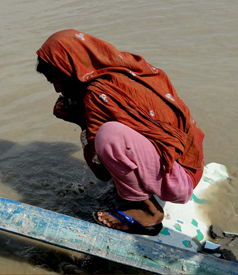As the world comes to terms with the mind-boggling scale of the tragedy in Pakistan, many Americans are asking what we can do to aid the flood victims.
Some may hesitate to contribute to flood relief because we associate Pakistan with qualities we don’t admire—nuclear proliferation, religious fundamentalism, the oppression of women, and a corrupt and powerful military. But the people of Pakistan are more likely to be the victims than the perpetrators of these problems, and above all else, they are fellow human beings in dire need.
So how can we distance ourselves from the qualities we don’t like while offering solidarity to the people of Pakistan?
1. Support Independent Pakistan-based Relief Efforts
Independent, Pakistan-based charities are struggling to get the resources to help their fellow citizens. These groups offer a much-needed alternative to the fundamentalist groups seeking to increase their influence, to the military, and to international groups without a base in Pakistan. One of the most effective of these independent groups, according to Grassroots International, is the Abdul Sattar Edhi Foundation. This foundation has networks across Pakistan, a long history in the country, and a top-notch reputation for effectiveness. You can contribute by sending a check to their U.S. office, noting that your donation is for “flood relief”:
The Edhi Foundation
42-07 National Street
Corona, New York 11368
2. Support Women
Women are the most vulnerable part of the population, and the progress of women is key to the progress of the country. Aid to women helps with the immediate crisis, helps alleviate poverty for the whole family, empowers women—just 3 percent of whom are literate—and lays the foundation for greater freedom and autonomy.
The U.S. based Global Fund for Women is working with women’s groups on the ground in Pakistan. The fund can be counted on to support groups that are part of Pakistani culture and that have a long-standing reputation for effectiveness. You can make a tax-deductible donation to Global Fund for Women on their secure server here.
Contributing money is a critical and immediate way to help. But there are also key policies that will help Pakistan both with immediate needs and with the long period of recovery ahead.
3. Call for Debt Relief
Pakistan will need to devote its resources to relief and recovery for months and years to come. The Jubilee Network is calling for aid for flood relief to be made in the form of grants rather than loans. The Network—which is comprised of religious, human rights, and development groups—is also calling for a moratorium on debt repayments and for eventual debt cancellation. The U.S. government has a key role to play in this, so your voice on this issue matters.
Do you like this? Click here to get Truthout stories sent to your inbox every day – free.
4. Convert Military Aid to Humanitarian Aid
Pakistan is among the top recipients of U.S. military aid, receiving nearly twice as much for the military as it receives in economic aid. Now is the time to reverse the priority. A major U.S. relief effort would be a powerful statement of solidarity with the Pakistani people, demonstrating to them that the American people care about more than counteracting terrorism … and real solidarity would be a more effective strike against terrorism than missiles and drone attacks. American religious groups, peace organizations, human rights groups, and ordinary citizens can call for the conversion of military aid to aid that can alleviate human suffering and support rebuilding.
5. Confront the Climate Change Disaster
The Pakistan flood is just one of a growing number of humanitarian and ecological crises related to a heating planet. The disruption in rainfall patterns caused by climate change leads to food disasters and hunger. Megastorms, fed by rising ocean temperatures, mean larger and more destructive storms and flooding. Disappearing glaciers and exhausted rivers and aquifers mean water shortages. We should be prepared to respond to humanitarian crises around the world, and when possible, help people return home so they don’t become climate refugees.
But even more important is prevention. Around the world we must restore the natural systems that buffer storms and preserve water—like wetlands that release water slowly and reduce flooding, coastal marshes that offer protection from storm surges, and healthy forests that avert landslides and flooding. We should support efforts at local resilience—growing food for local consumption and buildings that can protect from storms and heat waves.
At the same time, we must get serious about reducing the emissions that are disrupting the climate stability our civilizations depend on. We can’t allow oil company-financed climate deniers to continue driving the climate debate. Any further dithering is irresponsible and potentially catastrophic. Along with responding to the disasters caused by a heating planet, we simply must do everything we can to address the causes of the climate crisis.
Join us in defending the truth before it’s too late
The future of independent journalism is uncertain, and the consequences of losing it are too grave to ignore. To ensure Truthout remains safe, strong, and free, we need to raise $24,000 by the end of today. Every dollar raised goes directly toward the costs of producing news you can trust.
Please give what you can — because by supporting us with a tax-deductible donation, you’re not just preserving a source of news, you’re helping to safeguard what’s left of our democracy.
